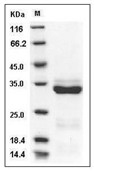- Remove All
 Your shopping cart is currently empty
Your shopping cart is currently empty
PRSS3 Protein, Human, Recombinant (His)
Trypsin-3, also known as Trypsin III, brain trypsinogen, Serine protease 3 and PRSS3, is a secreted protein that belongs to the peptidase S1 family. Trypsin-3 / PRSS3 is expressed is in pancreas and brain. It contains one peptidase S1 domain. Trypsin-3 / PRSS3 can degrade intrapancreatic trypsin inhibitors that protect against CP. Genetic variants that cause higher mesotrypsin activity might increase the risk for chronic pancreatitis (CP). A sustained imbalance of pancreatic proteases and their inhibitors seems to be important for the development of CP. The trypsin inhibitor-degrading activity qualified PRSS3 as a candidate for a novel CP susceptibility gene. Trypsin-3 / PRSS3 has been implicated as a putative tumor suppressor gene due to its loss of expression, which is correlated with promoter hypermethylation, in esophageal squamous cell carcinoma and gastric adenocarcinoma.

PRSS3 Protein, Human, Recombinant (His)
| Pack Size | Price | Availability | Quantity |
|---|---|---|---|
| 50 μg | $228 | In Stock | |
| 100 μg | $392 | 7-10 days | |
| 200 μg | $669 | 7-10 days | |
| 500 μg | $2,110 | 7-10 days |
Product Information
| Biological Activity | Measured by its ability to cleave the fluorogenic peptide substrate, Mca-RPKPVE-Nval-WRK(Dnp)-NH2. The specific activity is >4,000 pmoles/min/μg. (Activation description: The proenzyme needs to be activated by enteropeptidase for an activated form) |
| Description | Trypsin-3, also known as Trypsin III, brain trypsinogen, Serine protease 3 and PRSS3, is a secreted protein that belongs to the peptidase S1 family. Trypsin-3 / PRSS3 is expressed is in pancreas and brain. It contains one peptidase S1 domain. Trypsin-3 / PRSS3 can degrade intrapancreatic trypsin inhibitors that protect against CP. Genetic variants that cause higher mesotrypsin activity might increase the risk for chronic pancreatitis (CP). A sustained imbalance of pancreatic proteases and their inhibitors seems to be important for the development of CP. The trypsin inhibitor-degrading activity qualified PRSS3 as a candidate for a novel CP susceptibility gene. Trypsin-3 / PRSS3 has been implicated as a putative tumor suppressor gene due to its loss of expression, which is correlated with promoter hypermethylation, in esophageal squamous cell carcinoma and gastric adenocarcinoma. |
| Species | Human |
| Expression System | HEK293 Cells |
| Tag | C-His |
| Accession Number | P35030-3 |
| Synonyms | TRY4,TRY3,T9,RP11-176F3.3,PRSS4,protease, serine 3,MTG |
| Construction | A DNA sequence encoding the human PRSS3 isoform c (P35030-3) (Met 1-Ser 247) was expressed, with a polyhistidine tag at the C-terminus. Predicted N terminal: Val 16 |
| Protein Purity | > 95 % as determined by SDS-PAGE  |
| Molecular Weight | 26.6 kDa (predicted); 33 kDa (reducing condition, due to glycosylation) |
| Endotoxin | < 1.0 EU/μg of the protein as determined by the LAL method. |
| Formulation | Lyophilized from a solution filtered through a 0.22 μm filter, containing 50 mM MES, 0.6M NaCl, pH 5. 0.Typically, a mixture containing 5% to 8% trehalose, mannitol, and 0.01% Tween 80 is incorporated as a protective agent before lyophilization. |
| Reconstitution | A Certificate of Analysis (CoA) containing reconstitution instructions is included with the products. Please refer to the CoA for detailed information. |
| Stability & Storage | It is recommended to store recombinant proteins at -20°C to -80°C for future use. Lyophilized powders can be stably stored for over 12 months, while liquid products can be stored for 6-12 months at -80°C. For reconstituted protein solutions, the solution can be stored at -20°C to -80°C for at least 3 months. Please avoid multiple freeze-thaw cycles and store products in aliquots. |
| Shipping | In general, Lyophilized powders are shipping with blue ice. |
| Research Background | Trypsin-3, also known as Trypsin III, brain trypsinogen, Serine protease 3 and PRSS3, is a secreted protein that belongs to the peptidase S1 family. Trypsin-3 / PRSS3 is expressed is in pancreas and brain. It contains one peptidase S1 domain. Trypsin-3 / PRSS3 can degrade intrapancreatic trypsin inhibitors that protect against CP. Genetic variants that cause higher mesotrypsin activity might increase the risk for chronic pancreatitis (CP). A sustained imbalance of pancreatic proteases and their inhibitors seems to be important for the development of CP. The trypsin inhibitor-degrading activity qualified PRSS3 as a candidate for a novel CP susceptibility gene. Trypsin-3 / PRSS3 has been implicated as a putative tumor suppressor gene due to its loss of expression, which is correlated with promoter hypermethylation, in esophageal squamous cell carcinoma and gastric adenocarcinoma. |
Dose Conversion
Sci Citations
Calculator
Tech Support

Copyright © 2015-2025 TargetMol Chemicals Inc. All Rights Reserved.


